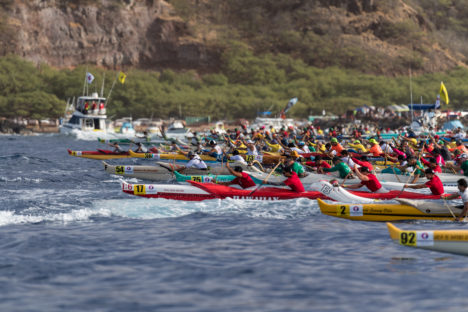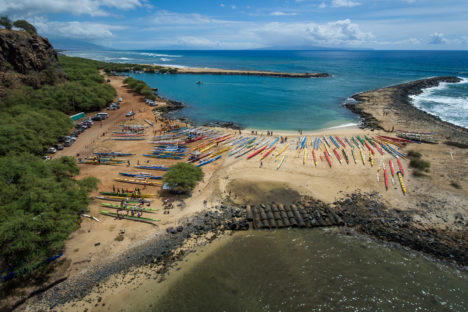Canoe Races Return
By Catherine Cluett Pactol | Editor

Photo by 808photo.me.
After a four-year break during the pandemic, the famed Molokai Hoe and Na Wahine O Ke Kai paddling races are back on. There’s both excitement among paddlers for their return, as well as challenges to overcome. The women’s crossing will be on Sept. 24 and the men’s race is set for Oct. 8.
Hundreds of paddlers from around the globe flock to Molokai each year for the iconic Ka’iwi Channel crossings – and that can put a strain on the island’s resources, particularly after COVID.
One of the biggest obstacles race organizers and community members considered in discussions of whether or not to bring the races back was how to get paddlers to Molokai.
“We ask paddlers to look at the way that they’re going to be traveling to the island of Molokai,” said Ikaika Rogerson, co-chair of the Molokai Hoe. “There’s only one carrier. The plane holds nine people at a time. We did speak to Mokulele’s president, and they’re willing to make some flight changes.”
Mokulele confirmed they are planning ways to minimize the impact of paddlers’ travel on those weekends.
“We are working with the organizers to determine how many extra flights are needed and on what days,” said Keith Sisson, Mokulele chief of staff. “Once we have that information, we will add flights late at night and in the very early morning for the paddlers so that the normal flying day of the local residents has minimal disruptions. If we need extra flights during the day, we will pull capacity from our Big Island flights on those days.”
Additionally, Sisson said they made some fare changes for current bookings on race weekends.
“We have raised the fares on days around the canoe races on scheduled service flights in an effort to deter the paddlers from buying those,” he said. “The fares will be back to normal seven to eight weeks prior to the day of flight… so this plan should have very little impact on locals.”
Rogerson said along with special flights to Molokai, race organizers are encouraging visiting paddling teams to get creative.
“We’re also asking paddlers to look at the way you get to the island, like maybe you’ve already hired an escort boat, maybe going to pay a little bit more and come over on your escort versus coming over on a plane, or maybe that means flying to the island of Maui and catching a ride over that way,” said Rogerson.
Molokai’s Kawika Crivello, who has been working with race organizers as a community liaison during the planning process along with his wife Lori-Lei Rawlins-Crivello, said their goal is for no paddlers to book Mokulele’s regularly scheduled flights. He said they’re working with Molokai boat captains to shuttle paddlers to Molokai who will be flying into Maui. They’re also encouraging crews that if they have an escort boat hired for the race, to pay them a little more to bring paddlers directly to Molokai.
“Our message is, hey, our people needs the flights, they need the seats, especially for medical purposes… That’s the only means of transportation,” said Rawlins-Crivello.
Crivello said the past several years have been spent in discussions of how the race can be better and work more closely with community to do it the “right way.”
“Understand that when you come to Molokai, we decide when it’s going to happen, and if it’s going to happen,” he said the message from Molokai has been to organizers. “And when everything is pono, everything is made right… it is only then that we will allow you to step in and do it the right way.”
Rawlins-Crivello said organizers have been patient and respectful of the community’s concerns.

Photo by 808photo.me.
“They’ve been very keen on what Molokai’s needs and wants are,” she said. “Respect, hands down, on the top of their list. To wait it out these past years, every year, come back: ‘No, we’re not ready.’ OK. ‘We respect that,’ had no problem, never fought it. Wanting to do what’s best for Molokai.”
Rogerson said organizers are also looking at ways for paddlers to volunteer with community efforts while they’re on Molokai and give back to the community.
Molokai families typically help host visiting paddlers.
Resident Donna Paoa recalled a call she got before the Molokai Hoe back in 1975.
“There were 100 Tahitian men’s paddlers that had nowhere to stay, and we got the call on a Saturday night. We had hardly any food. The stores were closed, and of course we took two crews. And we’ve been friends with some of those folks ever since,” she said.
But the concerns of some residents go beyond logistics when it comes to hosting canoe races.
In past years, escort boats have been known to anchor off Molokai, fill their coolers with fish, then leave. Crivello said overfishing has been well documented and has even resulted in altercations between visiting boats and residents. Though it can’t be legally enforced, race organizers have been working on education to share information about Molokai’s subsistence lifestyle and discourage heavy fishing while around the island.
Another community frustration has been an increase in the number of races that leave from Molokai.
“Now it’s not just Molokai Hoe and Na Wahine O Ke Kai… it’s all these different races now that bring in all these escort boats and all these visitors but yet have no education of who we are,” said Crivello. “They come in and they go and there’s no giveback to the community. It was basically just come, do their thing — use Molokai as a jump off and go.”
But he said of the residents he’s talked to, most are in favor of supporting the Molokai Hoe and Na Wahine O Ke Kai for their tradition. He said it’s important to get back to a feeling of unity and community involvement surrounding the races, and also educate the greater paddling community about what makes the island so special.
“When you mention the Molokai Hoe, it truly represents the culture of who we are and what we represent that of Molokai…. it’s the island that really makes this race, the people, the lifestyle, the culture, the aloha,” said Crivello.
The men’s race began in 1952, and the first women’s crossing was in 1979. The races are steeped in culture and island traditions, many of which have disappeared over the years.
Rogerson said Molokai holds a special title that many residents may not even be aware of.
“The first race was won by a Molokai canoe club,” he said. “I don’t even know that there are canoe club. They were workers that said that they were all going to band together and they were going to enter the race and they came out the winners.”
Many Molokai residents have fond memories of the races’ early days. It used to be a huge celebration at Hale O Lono harbor, and Crivello said his wife has fond memories of her family’s involvement.
“Remembering her papa and her grandmother hosting many clubs back in the days of going to Hale O Lono, camping there and that feeling and welcoming of an excitement of the community and the paddlers,” he said. “And that, you know that ‘ohana wa’a, the true ohana feeling, she remembered that feeling and she wanted to bring that back.”
Paoa also has fond memories of the early days.
“Going way, way back to when we used to camp at Hale O Lono for the men’s race and the Royal Court for Aloha Week would be staged at Hale O Lono and the Tahitians would play music all night and Mel [her late husband who worked as a paramedic] and I took down the American Red Cross vehicle because we were there in case anybody needed help,” she said.
To bring that feeling back, Rawlins-Crivello was one of the community members who organized an event starting in 2014 called Kulaia, which represented a revival of those celebratory traditions. The event’s purpose was to bring the community and paddlers together, share the aloha spirit and remember the history of the races. Kulaia hasn’t been held since 2019 and organizers say they aren’t going to bring it back this year, but they do plan to continue it in the future.
Paoa is a paddler herself and has crossed the Ka’iwi Channel 16 times.
“For anyone who has never crossed the channel, they wouldn’t know how important it is and for everyone who supports those who do, especially the local folks, you know it’s life changing in many ways for a lot of people when they get to cross the channel.”












Don't have a Molokai Dispatch ID?
Sign up is easy. Sign up now
You must login to post a comment.
Lost Password